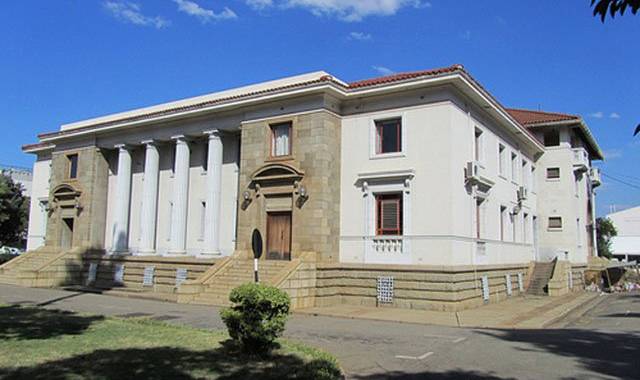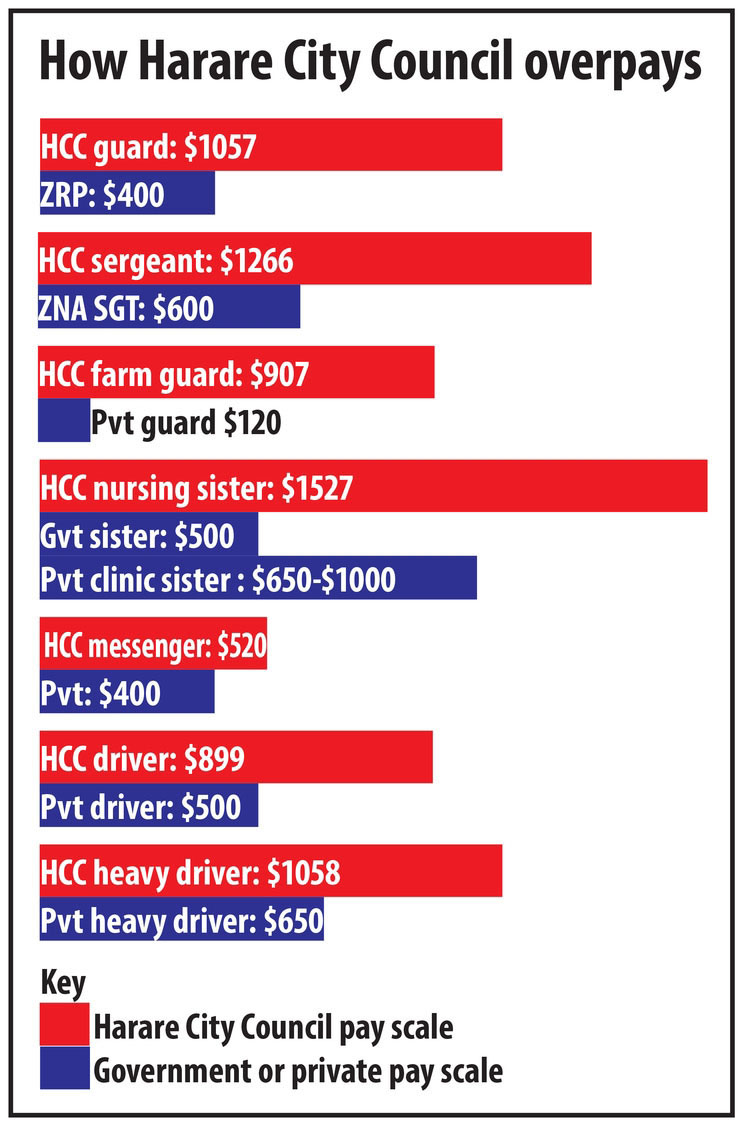
The Sunday Mail

For the capital city, Harare, the barbarians are no longer at the gates — they have literally overran the city.
We are reminded of this every morning through swathes of littered roads and reeking alleyways; and we are also reminded of this in the evening, where vendors choke both roads and pavements, making it difficult for vehicular and human traffic to navigate through the city.
But this a just a microcosm of the bigger and weightier problems faced by ratepayers across the length and breadth of the country: water supplies remain intermittent; the streets remain poorly lit; traffic lights that are supposed to enforce orderly movements remain dysfunctional; and waste collection is non-existent.
And the haphazard settlements, which are dotted in and around the city — some on wetlands, among curious sitings — against the cardinal creed of city planners are a clear example of a city that has been progressively decaying.
The city fathers who are charged — nay, paid, and paid handsomely for that are matter — to oversee an orderly, modern city remain embarrassingly unfazed.
The MDC Alliance in their manifesto launched on June 6 couldn’t have captured it any better.
“It is obvious that all Zimbabwe’s cities and towns are in a state of decay characterised by collapsed infrastructure, overcrowding, slums and other forms of informal settlements.
“In Harare, Julius Nyerere Way, Robert Mugabe Road, Mbuya Nehanda and Chinhoyi Street in particular, more than any other streets in Zimbabwe typify the extent of the decay. Like Monrovia, Freetown, Kinshasa or Luanda, these streets are like overcrowded post-war rum shackles (ramshackles) (sic)”.
The only dissonance in their observation is that this rot has been happening under their watch.
For the greater part of the past 15 years — in fact, since August 30, 2003 when the MDC gained control of six of the country’s seven largest centres through mayoral and urban council elections — urban local authorities have been an outpost of the opposition political formation.
Of the 45 Harare city councillors that were elected in 2003, 44 were from the MDC, while one was from the ruling Zanu-PF.
Over the years, their grip on urban local authorities has relented somewhat, with the number of their councillors in Harare dropping marginally to 38 to Zanu-PF’s seven councillors, but they remain in effective control nonetheless.
Handsomely paid incompetent councillors
When pressed by ratepayers to account for poor service delivery, city fathers almost always plead poverty.
While this might be true to an extent, over the years ratepayers have come to know that a toxic combo of incompetence and flagrant spending, especially on salaries, has undermined the capacity and competence of local authorities.
Harare City Council (HCC) Mayor, Councillor Bernard Manyenyeni, perhaps betrayed by his disarming professionalism and innocence, has helped to better understand the extent of the incompetence and ostentatious lifestyles of those who are charged with running the affairs of the city.
With City of Harare’s salary bill chewing more than 90 percent of revenues, it seems absurd that ratepayers have actually been paying or rewarding the city fathers for being incompetent.
In January this year, Mayor Manyenyeni, who was elected by his peers on September 16, 2003, was clear that HCC’s salaries are the elephant in the room.
“Just illustrations, which I believe are sustainable across the entire council payroll, I will indicate that a council municipal guard or patrolman costs the city $1 057 per month, while a ZRP (officer) costs (Government) just $400 per month, which is 2,5 times higher,” he noted at a meeting held with senior officials from the Ministry of Local Government, Public Works and National Housing in January.
He added: “A council nursing sister costs the city $1 527 while a Government nursing sister (earns) just over $500; that is more than three times. A private clinic sister earns between $650 and $1 000. Other indications are that a council farm guard costs $907.”
Overall, though the city collects between $12 million to $13 per month in revenues, it shells out more than $10 million in salaries, which leaves it with neither headroom nor legroom to support service delivery.
But worryingly, the wage bill can be explained in political terms.
It is not a secret that, as has become the culture in local politics, most recruitments were and are made in the typical nepotistic “we-have-made-it” mentality, which prioritises political kinship over meritocracy.
So it is not surprising that despite Mayor Manyenyeni’s strident calls to review salaries, there hasn’t been any political will to see this through, as this is perceived to undermine the MDC’s political base.
But this also breeds another nauseating phenomenon of city workers that are merely paid for the sake of it, and not for any demonstrable work.
This is why invisible municipal police can afford to take away more than $1 000 in salaries for work which they cannot account for.
So, they remain ghost workers at best.
Even those that are supposed to superintend over policy making — councillors — seem to be thoroughly incompetent and incapable of discharging their mandate.
Again, Mayor Manyenyeni and ex-Mayor Muchadeyi Masunda have spoken at length about this.
In 2011, a US-based independent consultant who has worked with the USAID and RTI International, Mr Gary Bland, accurately captured this predicament.
“With limited experience, as well as less education, elected officials are at a significant disadvantage vis-à-vis the administrators with respect to the management of local affairs. This imbalance in education and experience between the elected officials, many of whom are now from the MDC, and the senior administrative staff, most of whom were appointed by the Zanu-PF minister of local government, further fuels the political tension within the local authority,” he observed.
And this is the burden that the voter will carry with them to the ballot box on July 30.
Under Zimbabwe’s electoral laws, one only needs to be above 21 years to be elected as a councillor.
The mess that needs cleaning
If there is one sickening attribute of the old politics that needs to be consigned to the dustbin, it is blame-shifting.
For far too long, management at local authorities have conveniently blamed central Government for interference and starving them of the much-need resources in order to absolve themselves from shouldering the responsibility of the mess our cities find themselves.
But there are countless cases where this clearly does not stick.
The manner and recklessness with which the $144,4 million water deal between the Harare City Council and China National Machinery and Equipment Import and Export Corporation (CMEC) to refurbish water and sewage treatment plants was handled clearly borders on criminal dereliction of duty.
For a nation that has an unsaid standard of completing mega projects within three years, the water deal, which began in 2010, has arguably become the most long-drawn-out the Chinese have had to implement in Africa.
The project was initially scheduled to have been completed by the end of April 2014.
Eight years down the line, the project remains incomplete.
“Every day we are waking up to surprises, the deal continues to be too cloudy to be ignored.
“There are reports that council bought vehicles using funds from the water project. We cannot continue to ignore these reports, we have to do something about them,” Mayor Manyenyeni complained at a full council meeting on May 15, 2014.
When the details began coming out, it became even more worrying.
An assessment made by consulting engineer, Peter Morris, in December 2013 indicated that some of the prices for equipment were inflated more than five times.
The engineer was hired under the Zimbabwe Multi-Donor Trust Fund administered by the African Development Bank’s Urgent Water Supply and Sewerage Rehabilitation Project to assess the loan deal.
Some of the discrepancies noted in the report showed that 14 DN300 gate valves with extension spindle were pegged at US$90 241, including installation cost, although similar valves were bought at R10 910 (around US$1 000) each in a contract with the Gweru City Council.
This means the 14 valves could have been bought at around $14 000 instead of the $90 241.
Faced with such murk, the Chinese understandably turned off the taps.
It had to take the recent visit by President Mnangagwa to China in April to convince Beijing to turn on the taps again.
Failure to raise funds
Most experts believe that the decrepit infrastructure affecting most cities, Harare included, provide an incredible opportunity for investors who seek profits through rehabilitating the same.
But HCC seems to be inexplicably failing to raise funds or finding private partners to undertake these overdue projects.
With the water department contributing more than 80 percent of revenues for Harare, the city fathers somehow have been prevaricating on rolling out prepaid water meters that can help improve collections.
A solid balance sheet that is supported by the ability to collect revenues can serve as collateral to raise funding for infrastructure projects or attract investment for the same.
And therein lies the problem.
Council books need to be audited and qualified by independent auditors.
But this will be a political inconvenience for authorities that would want to shield most anomalies that are expediently used to support their political constituencies.
“We have an in-house payroll which no one outside council will ever trust,” Mayor Manyenyeni said in January this year.
As councils traditionally have four sources of revenues — government grants, internally generated funds, borrowing and donors — it is difficult in the circumstances to see how they could raise funds through any of these sources; more so, through municipal bonds.
Research found out that in addition to financial illiteracy and lack of technical ability, some municipalities do not want to be exposed for their uncreditworthiness.
This is a challenge that Zimbabweans face going into the 2018 harmonised elections.
While most of the focus has been on Presidential and National Assembly elections, little attention has been paid to local authority elections.
And this might be fatal.
Such questions should definitely weigh on the voters mind as they go to the polls next month.
Councillors should be voted in because of their competence, and not political tribe.
Tied to that, every effort should also be made to liberate local authorities, which are a critical component to investment as they directly interface with investors.
Just as the South African Municipal Finance Management Act that was passed in 2004 dictate, there is need for locals to demand better and greater transparency from councils.
Financials need to be audited, qualified and published.
This will definitely provide the plinth from which to rebuild the local authorities.
As is generally agreed by ratepayers, the situation in our cities is now untenable and something definitely has to give.
Feedback: [email protected]




